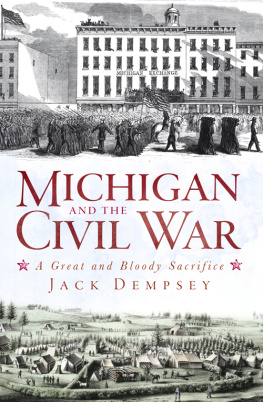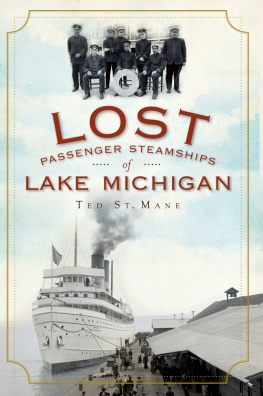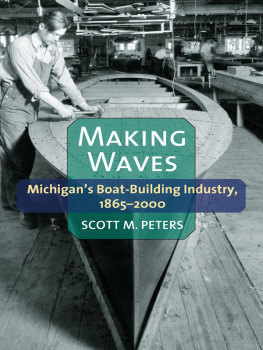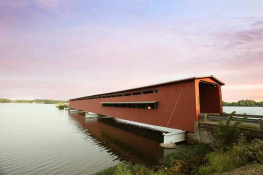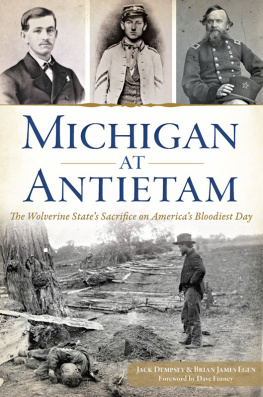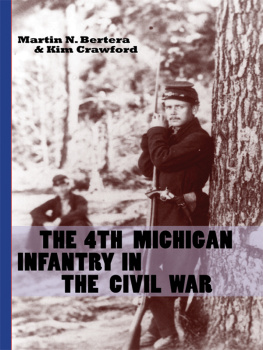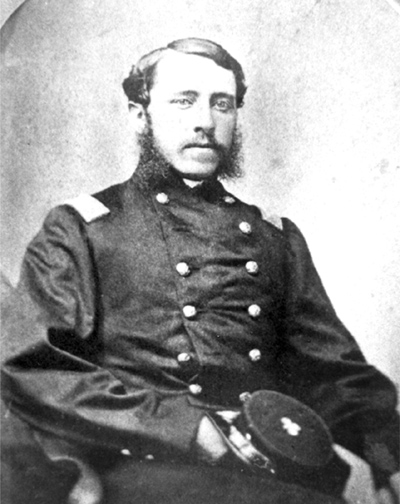.................................................................................................
A Great and Bloody Sacrifice
J ACK D EMPSEY
Published by The History Press
Charleston, SC 29403
www.historypress.net
Copyright 2011 by Jack Dempsey
All rights reserved
All photos are courtesy of the Archives of Michigan.
First published 2011
e-book edition 2011
ISBN 978.1.61423.022.9
Library of Congress Cataloging-in-Publication Data
Dempsey, Jack, 1952
Michigan and the Civil War : a great and bloody sacrifice / Jack Dempsey.
p. cm.
Includes bibliographical references and index.
print edition: ISBN 978-1-60949-173-4
1. Michigan--History--Civil War, 1861-1865. 2. United States--History--Civil War, 1861
1865. I. Title.
E514.D46 2011
977.403--dc22
2010050612
Notice: The information in this book is true and complete to the best of our knowledge. It is offered without guarantee on the part of the author or The History Press. The author and The History Press disclaim all liability in connection with the use of this book.
All rights reserved. No part of this book may be reproduced or transmitted in any form whatsoever without prior written permission from the publisher except in the case of brief quotations embodied in critical articles and reviews.
To Michigan, home of my heart; to Michiganders, hardy and hopeful; and to the one who fashioned all.
C ONTENTS
P REFACE
A half-century ago, Civil War author and native Michigander Bruce Catton delivered the eleventh annual Lewis Cass lecture, when he received an honorary doctorate of humanities from Wayne State University in Detroit. His remarks were entitled Michigans Past and the Nations Future. As was typical with Catton, the speech was thoughtful and poetic. It concluded with this glimpse of the road ahead:
It is here we need the kind of courage which a study of our own past can give us. We need boldness and we need imaginationthe boldness that finds materials for victory in the moment when the battle seems lost; the imagination that can look beyond the present crisis to the world that is waiting for us to enter it. We are not fighting a rear-guard action, after all. Our heritage contains the vision, the faith and the courage by which this dangerous path can be turned into an avenue toward the future. Man is still Gods instrument on earth; his dreams are still things that can survive him and become real.
Michigan continues its wandering journey on that path. Its pastincluding the last dispiriting decadeis prelude to a future that still depends for success, as it did in 1959, on imagination, boldness, faith and courage.
The Civil War generation of Michigandersblack, white and red, men, women and childrenhelped save the nation during its greatest crisis. Providing stalwart leadership, critical manpower, abundant materiel and political support for the Union cause, Michigan was a true blue state. Its people became extraordinary instruments of ultimate victory, yielding the promise of a new birth of freedom that today continues to be fulfilled. Even its own citizens have too often overlooked Michigans inestimable contributions during the War era. Current and future generations can take confidence and inspiration from the role Michigan played during the ordeal; beyond its lakes and borders, others may find lessons from the Great Lake State helpful in their own crisis.
We can still be extraordinary instruments.
Chapter 1
R OCKETS R ED G LARE
T he firing of Confederate cannons was unrelenting on this second day of the battle. From positions all around Charleston Harbor, forty-three hostile guns were trained on the United States fort on a man-made island, raining down solid shot and hot fire. The overmatched Federal garrison inside Fort Sumter fought back. Able to service less than ten guns, with the bulk of the force furiously stitching together ammunition bags to help the gunners keep firing back, the eighty-five members of the Federal contingent did their best for Old Glory as it whipped in the whirlwind above the ramparts. The sun was high this Saturday, April 13, 1861, but it was the heat and smoke from Rebel projectiles exploding on the parade ground that wore down the forts defenders.
The last of the cooked rations had been served at daybreak to the officers and men of the garrison. Now they would have to subsist on dried provisions, assuming their ammunition and the structure held out. One Rebel gun fired every quarter-hour during the night, and the full Confederate firepower opened up soon after dawn on day two. This days bombardment had better accuracy and greater effect. The walls and casemate took a fearful pounding; explosions of shot and shell shook the fort as in an earthquake. Mortar rounds sailed high into the air and plummeted almost vertically into the open space within the fort, endangering anyone who emerged from shelter. One shell arced through the roof of the officers quarters, and within moments, the building was fully engaged in flames. Men rushed to protect the ammunition and magazine from explosion. A glance at a timepiece would show it was near one oclock in the afternoon on this desperate day.
Suddenly, the main flagstaff toppled and gave way, succumbing to the damage from two Rebel shell hits. Broad stripes and bright stars fell to the parade ground, and one of the officers sprang into action. Lieutenant Hall rescued the precious bunting before it took fire, it would be recounted; that would be Second Lieutenant Norman Hall, United States Army, formerly of Monroe, Michigan. With the assistance of two others, Hall raised the shot-strewn banner onto a temporary flagpole, where it spread out its folds in the breeze and began to fly defiantly over the fortress again. Halls feat of bravery was but the latest act of service to his country during the tense times leading up to the battle. He had yet to reach his twenty-fifth birthday.
Norman Jonathan Hall had graduated from the United States Military Academy at West Point less than two years earlier. Ranking thirteenth in the 1859 class of twenty-two cadets, he would become twenty-two that year. Born in New York State on March 4, 1837, Hall moved with his family to London Township, Michigan, a bit west of Monroe, when he was still a boy. On March 19, 1854, he received an appointment to West Point from Michigan approved by the secretary of war, Jefferson Davis, the future Confederate president. Upon graduation, Hall received an appointment as second lieutenant in the Fourth U.S. Artillery and became ranking second lieutenant in the First U.S. Artillery on January 10, 1860.
Norman Hall.

